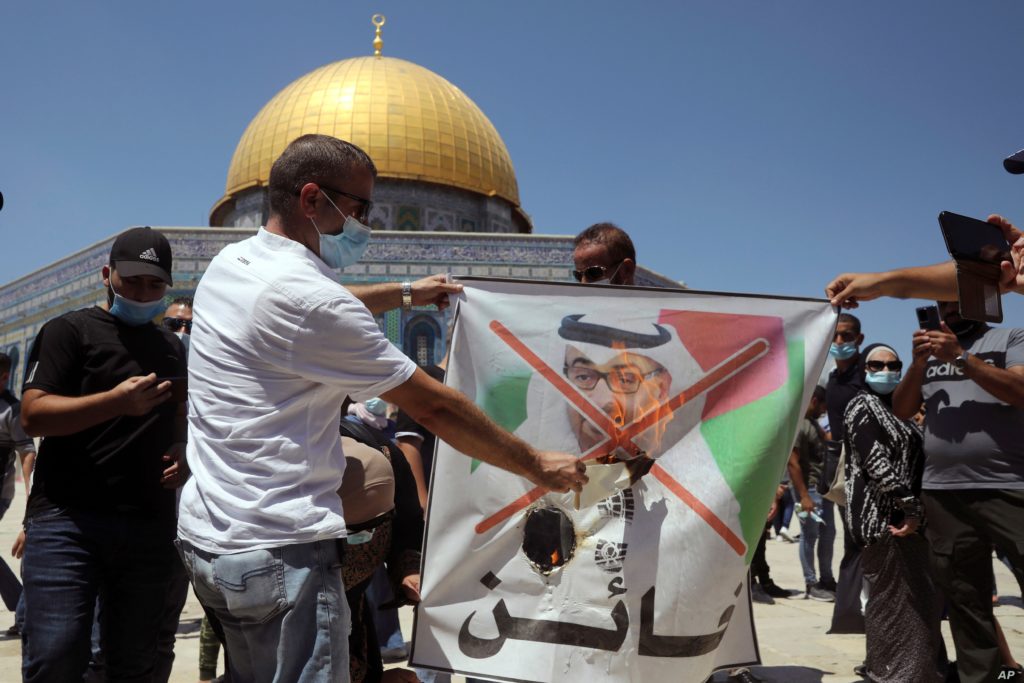Australia/Israel Review
Scribblings: The Palestinians’ Islamist messaging on the UAE deal
Sep 2, 2020 | Tzvi Fleischer

In this month’s edition, noted Israeli columnist Haviv Rettig Gur makes the point that Palestinian secular nationalist anti-colonialist claims against Israel are no longer resonating in the Arab world as they once did – yet Islamist messages still do among Muslim radicals. This is why most Arab states were not strongly opposed to or critical of the United Arab Emirates (UAE) decision to normalise relations with Israel in violation of the Arab tradition of opposing normalisation until the Palestinians achieve their demands. And this is why it is leaders of the Sunni and Shi’ite Islamist blocs – dominated respectively by Turkey and Iran – who have most strongly attacked the UAE decision.
The nominally secular Palestinian Authority (PA), led by Mahmoud Abbas, seems to be recognising that Islamist themes get a stronger reaction, and has been employing them heavily in its angry response to the UAE deal.
Jerusalem’s Al-Aqsa Mosque has featured especially prominently in its campaigns. The first official PA response to the UAE-Israel joint statement announcing plans to normalise relations was to declare it “treason against Jerusalem, the Al-Aqsa Mosque, and the Palestinian cause.” Similarly, the deputy chair of Abbas’ Fatah movement Mahmoud Al-Aloul said the UAE-Israel accord “constitutes a knife in the back of Palestine and treason against Jerusalem and the Al-Aqsa Mosque.”
An official spokesman of the Fatah party, Osama Al-Qawasmi, told official PA TV on Aug. 18 that the UAE deal risked encouraging “some of the remaining states to hurry towards normalisation – with whom? With the Israeli entity that is stealing the Al-Aqsa Mosque, the first direction for [Muslim] prayer, the second of the mosques, and the third in its sanctity for Islam.”
One of the key protests organised by Fatah against the deal, in which UAE flags and pictures of UAE Crown Prince Mohammed Bin Zayed were trampled on and burnt, took place during Friday prayers at the Temple Mount outside the Al-Aqsa Mosque on Aug. 14. Fatah openly boasted of that protest on social media.
The noted Palestinian affairs journalist Khaled Abu Toameh has pointed out that this demonstration was in effect a warning to citizens of the UAE not to visit Jerusalem or the Al-Aqsa Mosque via Israel, as opposed to entering via the West Bank. He points out that, in the past, certain Saudi and Bahraini visitors to the Mosque have been expelled or even physically attacked by local Palestinians on the basis that the people in question were engaged in “normalisation” with Israel.
PA religious officials have been explicit that this is indeed the message the Palestinians are now sending to UAE citizens. The PA’s Supreme Shari’ah Judge and Chairman of the Supreme Council for Shari’ah Justice Mahmoud Al-Habbash told official PA TV, “Whoever wants to come visit the Al-Aqsa Mosque through the gate of Palestine: Welcome, and we will rejoice over him… But whoever wants to come through the Israeli gate is unwanted, and he will find nothing but the shoes of the people of Jerusalem and the spit of the people of Jerusalem in his face.”
Al-Habbash also called the UAE deal “treason… Not just against the Palestinian people. This is a denial of the heritage of Prophet Muhammad,” and said, “Normalisation means that you agree to natural relations with your brother’s murderers… with the enemies of Prophet Muhammad.”
The PA’s Grand Mufti, Sheikh Muhammad Hussein, went even further than Al-Habbash, issuing a fatwa – a religious ruling – that forbids Muslims who come from the UAE via Israel from praying at the Al-Aqsa Mosque. He reportedly ruled such prayers are “forbidden” if worshippers arrive via Israel’s Ben Gurion Airport, as well as “legally false, religiously offensive.”
As Abu Toameh wrote, “The Palestinians have often accused Israel of denying them access to their holy sites, including Al-Aqsa Mosque. Now the Palestinians are showing the world that they are the ones who are seeking to prevent Muslims who believe in peace with Israel from praying at Al-Aqsa Mosque.”
At this point, this reliance on religious messaging by the PA, in addition to more secular messaging about Arab obligations to the Palestinian cause, is mostly rhetorical. The question that must be asked is: Will the PA at some point decide that, with secular messaging now largely ineffective across most of the Middle East, it needs to genuinely move into one of the Islamist camps to get support? Will it at some point seek to gain actual patronage from Iran or Turkey, which it has avoided up until now because both are sponsors of the PA’s main rival, the Islamist group Hamas that rules Gaza?
I asked Khaled Abu Toameh this during a recent AIJAC webinar and he agreed it was a worrying possibility.
Despite a sometimes naïve perception to the contrary, the PA has never actually looked at the Arab-Israel conflict as a dispute over land, amenable to compromise, as I have tried to demonstrate in this column over the years. However, the embrace of Islamism can only make any prospect of a two-state resolution even more distant and difficult.
Some Palestinians have noted that the UAE deal could provide opportunities for the PA leadership to finally reach a two-state agreement financed and backed by the wealthy Arab states. If the Palestinian leadership instead react to losing their traditional kneejerk support from the Arab world by turning to the Islamist extremist blocs, the long-suffering Palestinian people will miss yet another such opportunity.
Tags: Israel, Palestinian Authority, Palestinians, UAE






